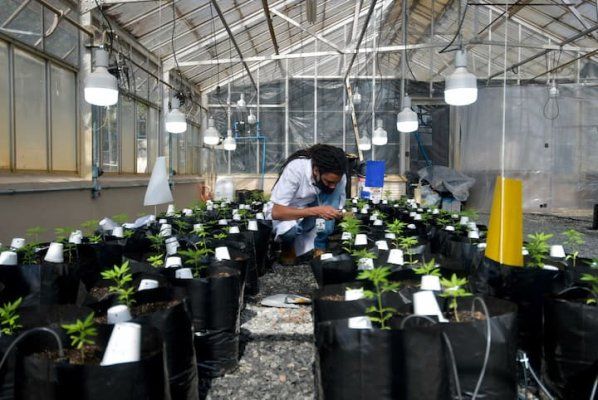After legislative efforts stalled in recent years, a Brazilian appeals court has agreed to rule on whether companies and farmers can plant cannabis in the country.
In an April 14 decision, the Superior Court of Justice (STJ), Brazil's top appeals court for non-constitutional matters, established its jurisdiction regarding the import of seeds and planting of cannabis nationwide.
Until the STJ makes a final and binding decision, all pending cases regarding permission to plant cannabis in the country will be frozen.
The Brazilian government allows the sale and production of cannabis products, but the key ingredients must be imported.
In light of the Supreme Court's 2011 ruling paving the way for same-sex marriage, the court's final ruling on cannabis could become a trailblazer on a controversial topic spurned by many in Brazil's conservative-leaning Congress.
Scientists and cannabis companies argue that Brazil's tropical climate is ideal for making it a leading global supplier of Cannabis sativa L, the plant that makes hemp and marijuana.
The ban on growing domestically increases the final cost of medicines for consumers who must import them.
Considering cannabis is a controversial issue, Congress is a little reluctant to decide on it, said Arthur Arsuffi, a lawyer representing DNA Solucoes em Biotecnologia in the STJ case. As a result, a decision has been delayed, and because of the number of lawsuits filed, the judiciary ends up having to deal with it."
DNA has brought a civil lawsuit arguing for the right to import seeds and plant cannabis with higher levels of cannabinoids, including cannabidiol (CBD), and less tetrahydrocannabinol (THC), which is a psychoactive substance in cannabis. There are advocates who claim hemp is beneficial in treating health conditions like childhood epilepsy because it has less than 0.3% THC and far more CBD.
In Canada, courts led the way on cannabis policy, according to Jose Bacellar, CEO of pharmaceutical firm VerdeMed.
Bacellar, however, said the STJ ruling on such a complex matter had risks associated with it, which would be best resolved by a congressional bill legalizing hemp plantations.
According to Victor Miranda, a lawyer, the STJ's decision to set precedent on the matter was consistent with Brazilian jurisprudence and gave no indication on how it would rule on the merits.
"It is hard to predict the outcome," Miranda said. "But a STJ ruling indicates the court is concerned about this."
In an April 14 decision, the Superior Court of Justice (STJ), Brazil's top appeals court for non-constitutional matters, established its jurisdiction regarding the import of seeds and planting of cannabis nationwide.
Until the STJ makes a final and binding decision, all pending cases regarding permission to plant cannabis in the country will be frozen.
The Brazilian government allows the sale and production of cannabis products, but the key ingredients must be imported.
In light of the Supreme Court's 2011 ruling paving the way for same-sex marriage, the court's final ruling on cannabis could become a trailblazer on a controversial topic spurned by many in Brazil's conservative-leaning Congress.
Scientists and cannabis companies argue that Brazil's tropical climate is ideal for making it a leading global supplier of Cannabis sativa L, the plant that makes hemp and marijuana.
The ban on growing domestically increases the final cost of medicines for consumers who must import them.
Considering cannabis is a controversial issue, Congress is a little reluctant to decide on it, said Arthur Arsuffi, a lawyer representing DNA Solucoes em Biotecnologia in the STJ case. As a result, a decision has been delayed, and because of the number of lawsuits filed, the judiciary ends up having to deal with it."
DNA has brought a civil lawsuit arguing for the right to import seeds and plant cannabis with higher levels of cannabinoids, including cannabidiol (CBD), and less tetrahydrocannabinol (THC), which is a psychoactive substance in cannabis. There are advocates who claim hemp is beneficial in treating health conditions like childhood epilepsy because it has less than 0.3% THC and far more CBD.
In Canada, courts led the way on cannabis policy, according to Jose Bacellar, CEO of pharmaceutical firm VerdeMed.
Bacellar, however, said the STJ ruling on such a complex matter had risks associated with it, which would be best resolved by a congressional bill legalizing hemp plantations.
According to Victor Miranda, a lawyer, the STJ's decision to set precedent on the matter was consistent with Brazilian jurisprudence and gave no indication on how it would rule on the merits.
"It is hard to predict the outcome," Miranda said. "But a STJ ruling indicates the court is concerned about this."




